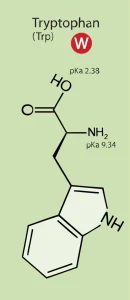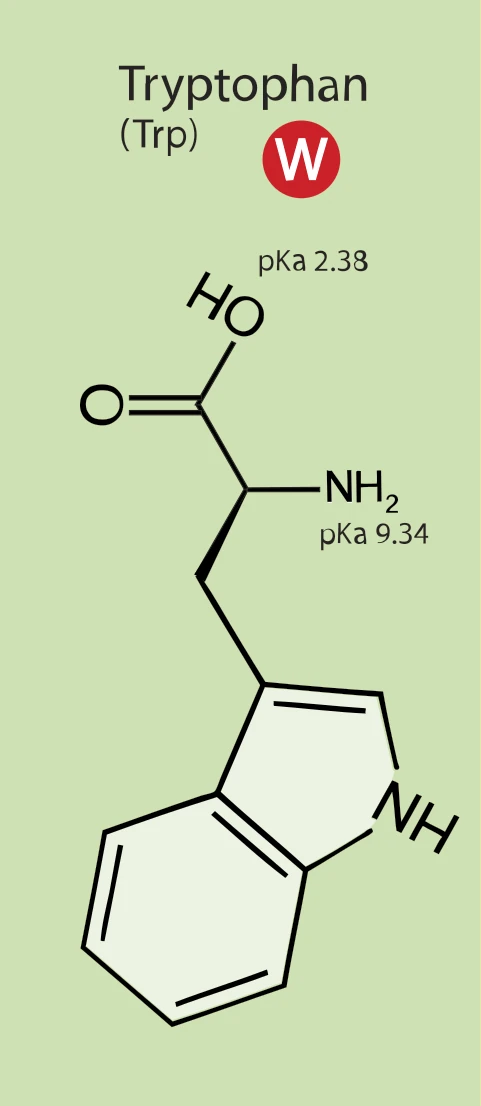
Tryptophan is an essential amino acid that plays a pivotal role in various physiological processes, particularly in the realms of mental health, sleep regulation, and exercise performance. As a precursor to serotonin and melatonin, tryptophan is integral to maintaining a positive mood and ensuring restful sleep, both of which are crucial for overall well-being. This essay explores the multifaceted benefits of tryptophan, emphasizing its significance in fitness and health from a positive perspective.
At the core of tryptophan’s benefits is its ability to enhance mood and emotional health. Serotonin, often referred to as the “feel-good” neurotransmitter, is synthesized from tryptophan. This neurotransmitter plays a vital role in regulating mood, anxiety, and happiness. Individuals who consume adequate amounts of tryptophan-rich foods may experience reduced symptoms of depression and anxiety, leading to improved emotional resilience. This is particularly relevant for those engaged in regular physical activity, as exercise itself can elevate serotonin levels in the brain. The combination of exercise and tryptophan-rich nutrition creates a synergistic effect that promotes mental clarity and emotional stability.
Moreover, tryptophan’s role in sleep regulation cannot be overstated. Melatonin, another crucial hormone derived from serotonin, helps regulate sleep-wake cycles. Adequate sleep is essential for recovery, cognitive function, and overall health. Athletes and fitness enthusiasts often face challenges related to sleep quality due to training intensity and lifestyle factors. By incorporating tryptophan into their diets—through foods such as turkey, dairy products, nuts, and seeds—individuals can enhance their ability to fall asleep faster and enjoy deeper sleep cycles. This improvement in sleep quality translates into better recovery times and enhanced performance during workouts or competitions.
The relationship between tryptophan and exercise performance is another area that highlights its significance in fitness. Research has indicated that tryptophan can influence endurance and pain tolerance during physical activity. When athletes consume tryptophan before exercising, it may lead to increased levels of free tryptophan in the bloodstream, which subsequently enhances serotonin production in the brain. This increase can help reduce perceived exertion during workouts, allowing individuals to push through challenging sessions with greater ease. Consequently, athletes may find themselves able to train harder and longer while experiencing less discomfort—a win-win situation for anyone looking to improve their fitness levels.
In addition to its psychological benefits, tryptophan also supports physical health through its involvement in protein synthesis and muscle growth. As an essential amino acid, it contributes to building muscle tissue and maintaining nitrogen balance within the body. For those engaged in strength training or bodybuilding, ensuring sufficient intake of tryptophan can aid in recovery and muscle repair after intense workouts. By promoting lean muscle mass while potentially reducing body fat percentage, tryptophan can be an ally for fitness enthusiasts aiming for optimal body composition.
Furthermore, tryptophan has been associated with various health benefits beyond fitness alone. Emerging research suggests that it may play a role in cardiovascular health by influencing cholesterol levels and supporting heart function. Additionally, its potential therapeutic effects on cognitive issues highlight its importance not only for athletes but for anyone seeking improved mental clarity and cognitive function as they age.
Incorporating tryptophan into one’s diet can be achieved through various means. Whole foods such as eggs, cheese, fish, poultry, nuts, seeds, and legumes are excellent sources of this amino acid. For those who may have difficulty obtaining adequate amounts through diet alone or who have specific fitness goals in mind, supplementation may be considered under professional guidance.
In conclusion, tryptophan emerges as a powerful ally in the pursuit of health and fitness. Its multifaceted benefits—ranging from enhancing mood and sleep quality to improving exercise performance—underscore its importance in maintaining a balanced lifestyle. By embracing a diet rich in tryptophan-containing foods or considering supplementation when necessary, individuals can harness its potential to enhance both physical performance and mental well-being. As we continue to explore the intricate connections between nutrition and health outcomes, tryptophan stands out as an essential component worthy of attention for anyone looking to optimize their health journey positively.
Need your own dietary supplement manufacturer? Extremely competitive rates. We produce it all. Talk to us.

Comments are closed